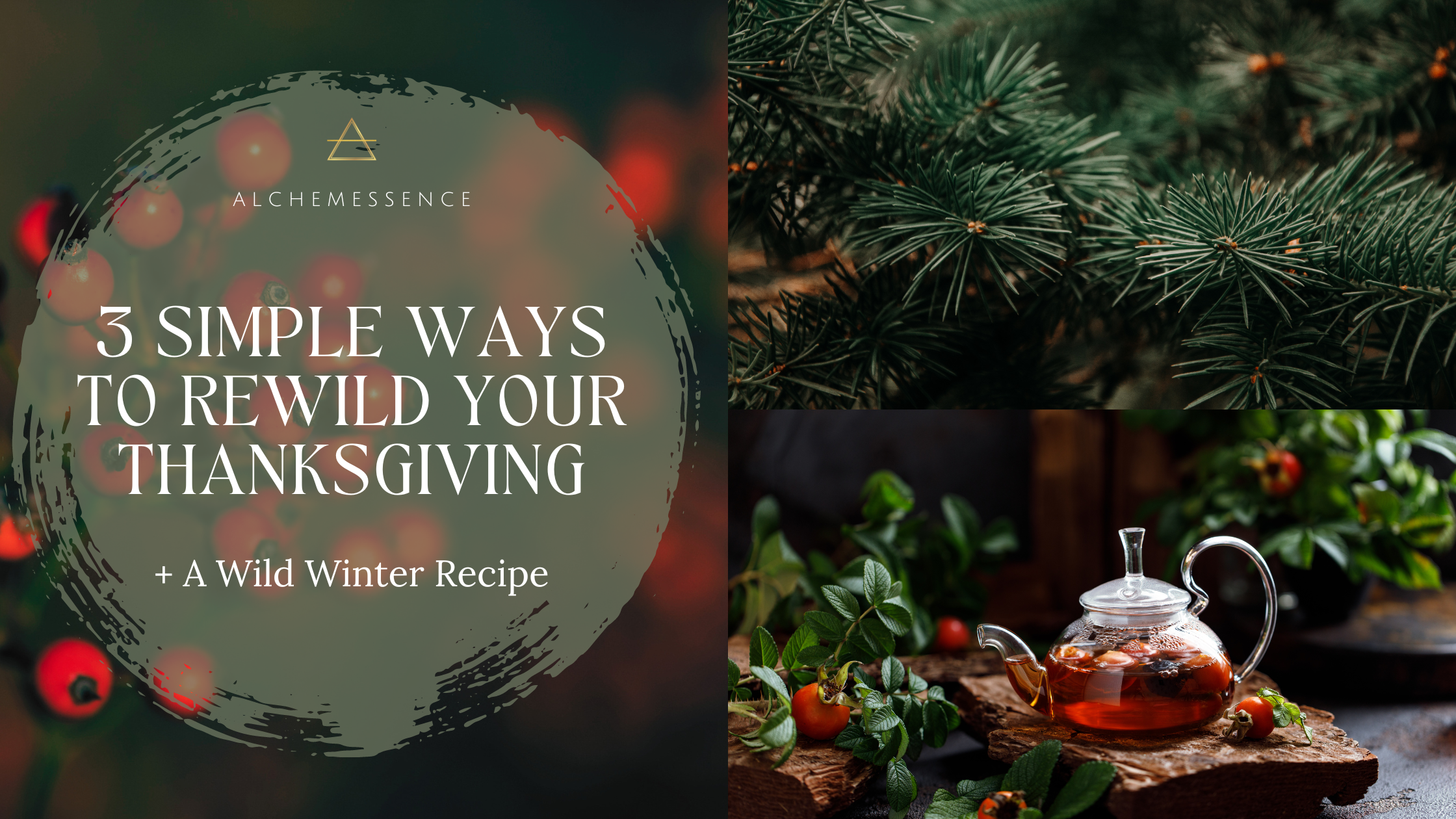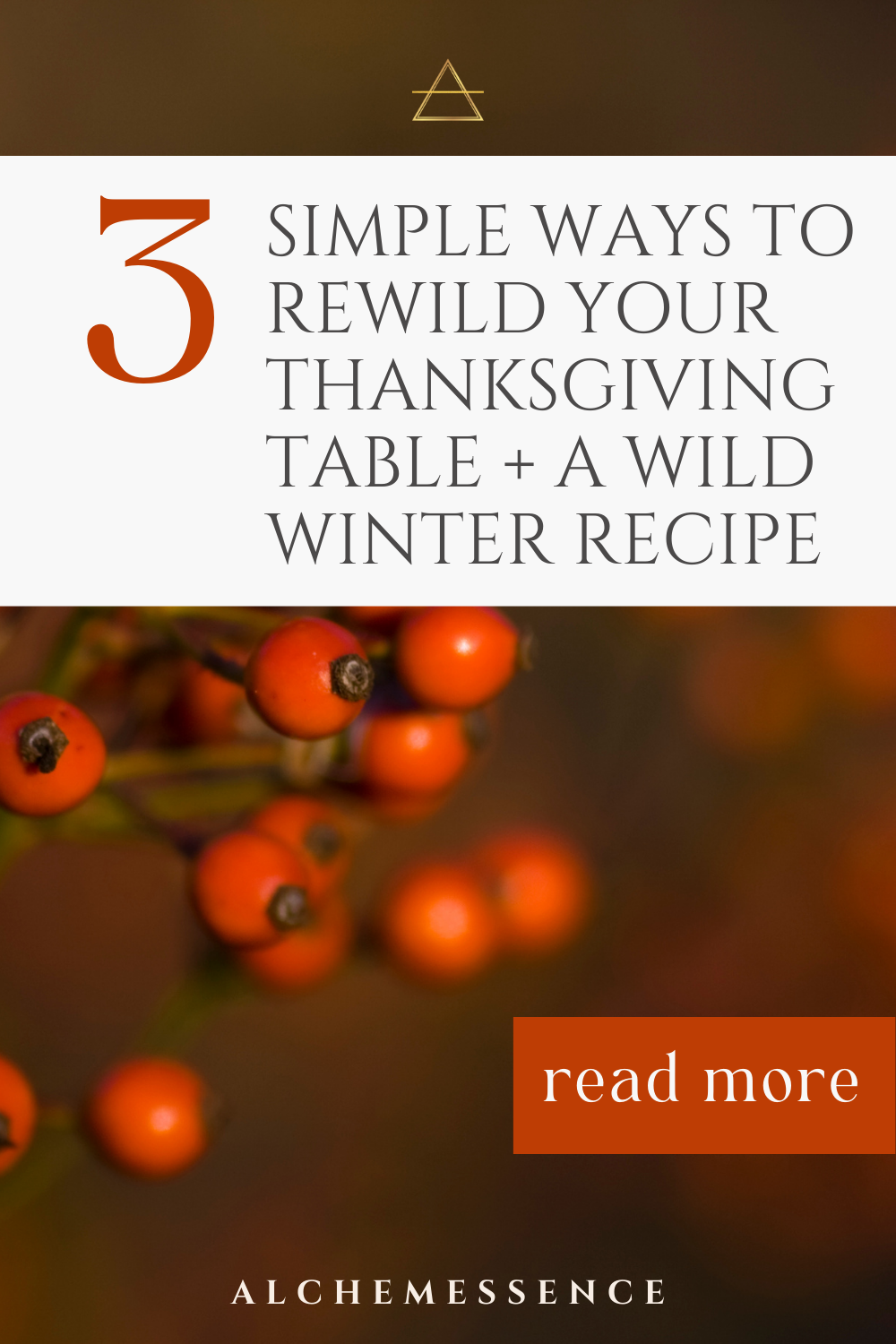3 Simple Ways to Rewild Your Thanksgiving Table + A Wild Winter Recipe
Thanksgiving mythology tells us that this holiday marks a time when native peoples helped pilgrims survive by sharing the bounty of a new land with them.
Obviously, the actual history of the holiday is a lot more complicated and painful than this simple recounting—something I reflect on here—yet the ritual of pausing to honor and show gratitude for the abundant gifts of the earth is one I continue to love in the midst of a complex history.
One of my favorite ways to truly celebrate the abundance of the earth, as well as the ancestral spirits of the land, is to incorporate local, wild foods into our menu.
Eating wild foods attunes our energy field and our DNA to the land we live on, and when done with reverence and gratitude, shows the spirits of the land that we don’t take our abundance for gratitude. It’s a way to nurture our relationship with place, open our hearts to mothering from our earth mother herself, and tend our well-being in physical and energetic realms.
Want to add a few wild bites to your Thanksgiving feasts this year? Here are a few simple wild foods available just about anywhere in the States…
Wild Greens
If you’ve been following along here and have some wild greens infused vinegar on hand (usually made in the spring), use it to replace any other acids in your recipes. It’s great for brightening up butternut squash soup and mixing into wild salad dressings.
Depending on where you live, you might still be able to gather some wild hearty greens in your area…even your backyard! Mallow, dandelion, chickweed, and nettle can often be gathered in small quantities even after the first snow. Sprinkle a few greens on side salads or even stir them into stuffing—the mild flavor goes with everything.
Rosehips
Rosehips are best collected after a few frosts, which heightens their sweetness. If you gathered hips earlier in the autumn, great! If not, even wilty looking rosehips can be gathered and cooked into tart cranberry sauces or brewed as nutrient-rich teas. (Just be sure to remove the hairs and seeds first!)
Evergreens
Evergreens are an abundant winter wild food available almost everywhere. Rich in vitamin C and other phytonutrients, evergreen needles can be infused into butters and finishing salts for a fresh, herbaceous flavor, or brewed into healing teas.
Most evergreens are edible, so you don’t need to worry too much about identification here. The two exceptions (that I know of at least) are yew trees and ponderosa pines. There’s mixed messaging on the edibility of both, but general consensus is to steer clear to be safe. Firs, spruces, and most other pines are just fine!
Yews are easily identified by their distinctive orange-red berries—see below. But, the berries aren’t always in season, so if yews are in your area make a positive identification first!
The signature berry of the yew tree—one of the few non-edible evergreens.
Ponderosas can be a bit trickier. If you know you have ponderosas in your area, watch out for tall strong trees with large pinecones and extra long needles. Any time you use any wild food, please quadruple check your identification. And then triple check again.
A Fragrant & Festive Wild Tea
This tea is based around two wild ingredients—evergreen needles and rosehips. From there, you can get creative with all sorts of fragrant herbs and spices.
Ingredients
2 cups water
A handful, roughly chopped evergreen needles
One extra large handful of fresh rosehips, or a smaller handful dried (either leave whole or remove seeds and tiny hairs if chopping)
3-4 slices of fresh organic oranges
One cinnamon stick
2-3 stars of anise
Lemon and honey to taste
Directions
Place water and herbs in a pot and simmer for 10 minutes. Remove from heat, stir in honey and lemon, and serve in festive mugs. Enjoy!
As always, whenever you’re working with wild foods, it’s wise to follow basic ethical and safety practices. In short, triple check your IDs and prioritize the health of the ecosystem above your own gathering needs.
You might also like:
Simple Tricks to Add More Health-Boosting Herbs into Your Daily Routine
The Ancestral Convergence: Food & Ritual for Healing this Thanksgiving
Celebrating Samhain: Modern Rituals and Festivities for Connection and Protection
Save this on Pinterest:





